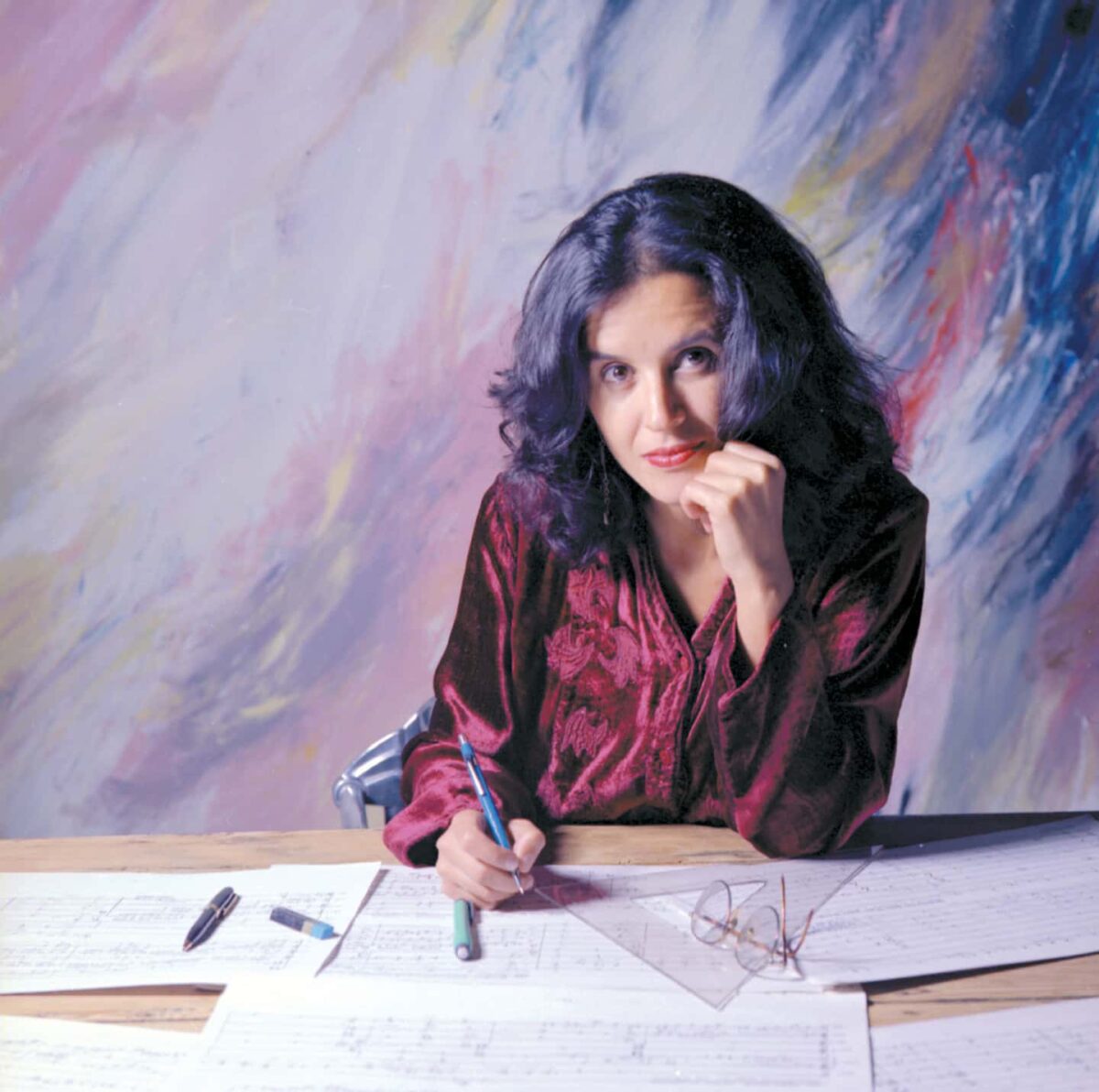Hilda Paredes
Hilda Paredes was born in Mexico were she began to study piano and flute. She arrived in London in 1979 where she continued her studies and performances as a flutist. In the first few years in London she also did several arrangements of popular and classical music for various ensembles with whom she regularly performed. Her first completed compositions date from this period.
As a composer she was an active participant in master classes at Dartington Summer School with Peter Maxwell Davies and Richard Rodney Bennett. She graduated at the Guildhall School of Music and obtained her Master of Arts at City University in London. She completed her PhD at Manchester University.
In 1988 she received the Music for Dance Award from the Arts Council of Great Britain for the creation of EL PRESTIDIGITADOR and was then invited to take part in the International Dance Course for Professional composers and choreographers.
She took part in the first Garden Venture Opera Project at Dartington, organised by Covent Garden Royal Opera House in the summer of 1989, where her first music-theatre pieces were completed.
In 1990, the Arts Council of Great Britain awarded her the fellowship for composers to complete her first chamber opera THE SEVENTH SEED, which is now released on CD by Mode Records (mode 60). During that year she returned to Mexico. While there, she taught at the University of Mexico and produced a weekly radio show specialising in new music for five years. She also published several articles on music in different music magazines and newspapers. She collaborated with the Orchestra of Baja California doing several arrangements and orchestrations of Spanish and traditional Mexican songs, some of which have been released on CD.
She has been the recipient of important awards in Great Britain, the USA and Mexico such as the Holst Foundation award for composers in the UK, the Sistema Nacional de Creadores Fellowship, the Rockefeller, Fund for Culture Mexico/USA award and recently the prestigious J.S. Guggenheim Fellowship.
Miss Paredes has been commissioned by soloists, ensembles and orchestras in Great Britain, France, Germany, Australia, Mexico and the U.S.A. Her music has been widely performed at important international festivals such as Dance Umbrella, and Huddersfield in the UK; Darmstadt, Eclat and the Romerbad Musiktage in Germany; Musique D’Aujourdhui and Octobre en Normandie, in France; Wien Modern, in Austria; Akiyoshidai Music Festival, in Japan; Archipel, in Geneva; De Ijsbreker Chamber Music Festival, in Amsterdam; Warsaw Autumn, in Poland; Ultima, in Oslo; Festival Cervantino and Foro de Musica Nueva in Mexico, amongst others.
She now lives in London as a freelance composer.
Reviews:
“…A densely knitted, eventful, turbulent, and simultaneously transparently light movement was to be heard by the Mexican Hilda Paredes”. – FRANKFURTER ALLGEMEINE
“One of the most powerful of the compositions was by Hilda Paredes” – MAIN-ECHO
“What the music of the Maya’s sounded like, nobody knows anymore. But the Mexican composer Hilda Paredes searches for answers in each recorded thought, in each numerological symbolism, and thus in the roots of her own culture” – WIESBADENER KURIER
“Its rhythmic vitality seduced an audience that was previously sceptical to any proposal by this Latin woman…the reaction was shocking, but with a telluric presence, like our volcanoes.” – REFORMA.
“…through Hilda Paredes’ superior expertise “Ah Paax’ob” shone with all its artistic tricks of the trade by assembling, as it were, polished raw-material” – FRANKFURTER RUNDSCHAU
“…The première of Hilda Paredes passed by in beautiful fortuitousness, with sounds like soap bubbles, before a certain twist gave the final chords a solid groundedness.” – GN – FRANKFURTER NEUE PRESSE
“…one would like to come across one or two of the works again in the context of a regular concert, amongst them “Casilium tun” by Hilda Paredes for four voices and string-quartet, with it’s ever shifting tonal colours and skilful interaction between the human voice and (partly manipulated) instrumental sounds, which commanded the scene to a standstill” – STUTTGARTER NACHRICHTEN.
The Seventh Seed (mode 60)
Listen How They Talk: Chamber Music 1998-2001 (mode 149)
Señales (mode 292)
Hilda Paredes on compilations:
Espacios Intemporales for saxophone quartet (2017) — on SIGMA Project – New Mexican Music For Saxophone Quartet (mode 331)
Uy u’tan — on The Arditti Quartet: Mexico – New Music for Strings (mode 165)

